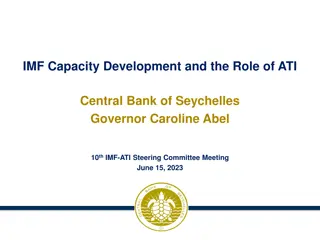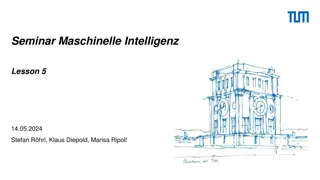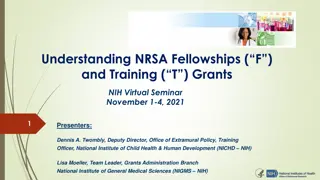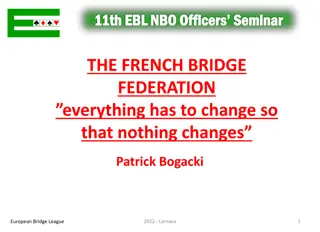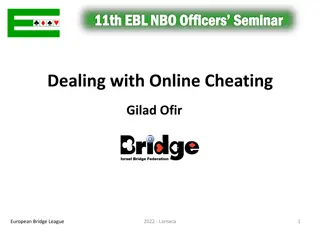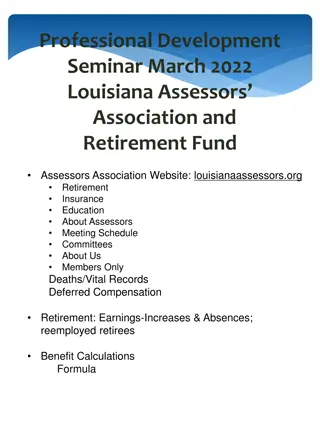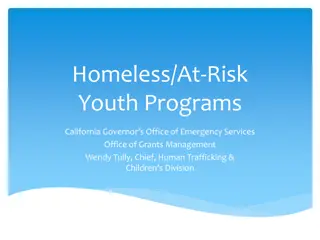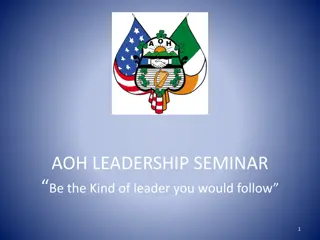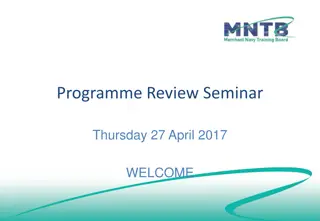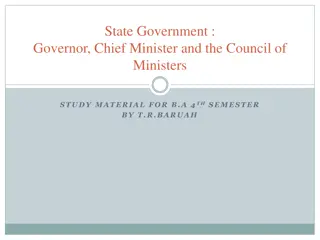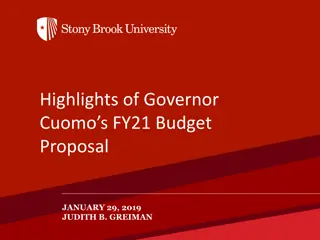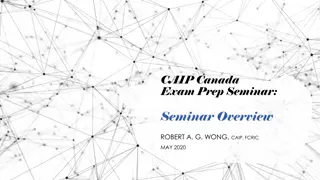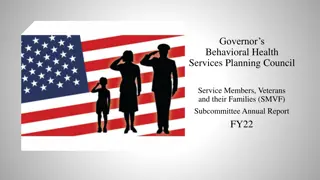Assistant Governor Training Seminar Highlights
The 2024 President-Elects Training Seminar featured valuable sessions for Assistant Governors, focusing on roles, supporting presidents, and collaborating effectively with District Governors. The agenda included discussions on AG responsibilities, club health assessments, and attributes of high-performing AGs. Attendees learned how to mentor club leaders, identify struggling clubs, and use coaching methods for support.
Download Presentation

Please find below an Image/Link to download the presentation.
The content on the website is provided AS IS for your information and personal use only. It may not be sold, licensed, or shared on other websites without obtaining consent from the author.If you encounter any issues during the download, it is possible that the publisher has removed the file from their server.
You are allowed to download the files provided on this website for personal or commercial use, subject to the condition that they are used lawfully. All files are the property of their respective owners.
The content on the website is provided AS IS for your information and personal use only. It may not be sold, licensed, or shared on other websites without obtaining consent from the author.
E N D
Presentation Transcript
2024 PRESIDENT-ELECTS TRAINING SEMINAR ASSISTANT GOVERNOR TRAINING SESSION February 3, 2024
Acknowledgements PDG Kathy Gallagher (Michigan) PDG Hector Ortiz (Pennsylvania) DG Brent Collingwood (District 5370, Alberta)
Objectives for the day Understanding the role How to support your presidents well developing strong relationships with your presidents where to go to get the knowledge & resources you need How to support the DG well panel discussion after lunch
Agenda Responsibilities, attributes and expectations of an AG Assessing a club s health Scenario, for small group discussion Supporting your clubs, supporting our DG, where to go for help Scenario, for small group discussion PDG panel fireside chat (after lunch)
Responsibilities, attributes and expectations of an AG
Source: The Learning Centre, Assistant Governor Basics
Attributes of high performing AGs knowledgeable collaborative connector influential visible and involved skilled communicator & good listener good judgment a coaching relationship with your presidents keeping the DG informed decide, refer, consult, or defer?
Expectations Source: The Learning Centre, Assistant Governor Basics
Objectives Assess a club s ability to thrive Mentor club leaders on strategies for success Identify warning signs of a struggling club Work with a struggling club to become more vibrant Using the coaching method to work with clubs
Healthy club indicators conducts regular self-evaluation makes long-term plans sets annual goals holds engaging meetings leaders communicate regularly leadership is a healthy mix of continuity and renewal good chemistry / group dynamics evidence of good financial management committee structure is suited to the club s size, culture, and formality
Struggling club indicators club isn t meeting regularly attendance issues member engagement issues group dynamics issues leadership succession issues failure to set or meet goals delayed payment of dues disconnected from District events
Club Health Check your experience in the club club service & socials membership recruitment, retention, engagement, diversity public image business and operations a detailed checklist for you Source: The Learning Centre, Assistant Governor Basics
What can you do? Be a coach to your president Help with goal setting Help to organize a club assembly or visioning session Attend club meetings to monitor progress Use the Club Health Check tool Seek advice from your AG Coach Keep the DG informed
What should you avoid doing? Telling the president what to do Casting a shadow over the president in club meetings Imposing solutions
Scenario #1, for discussion You visit one of your clubs from time to time. You notice that the club is moribund. Meetings are not engaging. The club goes through the motions of a standard business agenda. The club is not active in the community. Members donate to the club, to fund the club s community donations and donations to TRF. The president is serving for the third time. The president is happy to have you attend but is not seeking advice from the District. There is no friction in the club but there is no chemistry either. Questions: Should you intervene? What are the risks? If you choose to get involved, what issues would you expect to encounter and how would you manage through them?
Supporting your clubs. Supporting your DG. Where to go for help.
Supporting your clubs Involve District subject matter experts membership, foundation, public image, governance Help them navigate Rotary Club Central Assist with leadership and renewal issues https://rcc.rotary.org/#/dashboard
Supporting your DG What does the DG needs to know? What is the DG s management style? Which is the most appropriate approach? resolve the matter on your own assess & refer to the District s subject matter expert consult your DG Coach before responding defer to the DG Complete the AG Club Visit Checklist semi-annually
Where to go for help MyRotary https://my.rotary.org/en Rotary Club Central Learning Centre Your sounding boards AG Coach, other AGs the DG https://learn.rotary.org/members/learn/catalog/view/68
Scenario #2, for discussion One of your presidents is young, dynamic, new to Rotary, and a change agent by nature. The president wants to make significant changes to the club s meeting format and service projects. The president feels these changes are needed to bring in new members. Some club members are enthusiastic; others are not and have stated they will resign if they go through. This has come to your attention although not from the president. Questions: Should you intervene? What are the risks? If you choose to get involved, what issues would you expect to encounter and how would you manage through them?






